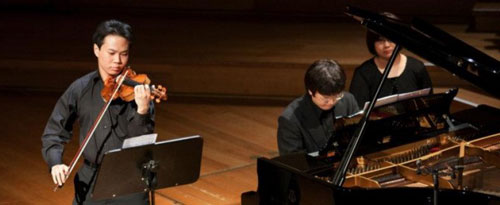Pushing The Limits: Nikki Chooi At The Queen Elisabeth Competition Finals by Jacqueline Vanasse
/ September 1, 2012
Version française...
Flash version here.

photo Bruno Vessié
It is often said that the Queen Elisabeth Competition (QEC), because of its long-standing presence, the difficulty of its rounds and its illustrious tradition, is like no other competition out there. This year’s edition, dedicated to the violin, saw young Canadian Nikki Chooi make it to the finals. Chooi was the first one to be in awe of his achievement: “Just the act of preparing for such a competition and making it to the finals is life-changing.” The musician, like most of the young finalists, admits having asked himself how he would survive the implemented seclusion at the Queen Elisabeth Music Chapel, cut off from all technology for one week. The seclusion, which is one of the competition’s special features, consists in isolating the 12 finalists the week before their final performance. Secluded from the outside world, without a computer or phone, the musicians must learn a contemporary work, specifically composed for the occasion. On the heels of this round, the young Canadian acknowledges it was refreshing to be “locked up” with eleven other great musicians. All in all, an enviable position for a young musician to be in, to breakfast, lunch and supper with eleven of the greatest talents of his generation—eleven distinct personalities that are often from tremendously different backgrounds and circumstances! The “obligation” to socialise with the other candidates has been a particularly stimulating experience for Chooi as well as for most of the other laureates, yet surprisingly it is an activity that has become somewhat unusual.
Aside from the social aspect of the week of isolation, it is the pedagogical facet that has left its imprint on Chooi. He says that he learned a lot about himself and, having pushed his limits, proved himself capable of much more than he previously thought. The violinist estimated that, under normal circumstances, it would have easily taken him a month or two of practice to learn the compulsory work. Now, he feels very proud of having learned such a difficult piece in only one week. At this point, he thanks his parents for the discipline, work ethic and organizational skills they have instilled in him from a young age and that have been very useful once he was on his own. The young man has grown from this experience. He feels confident going into the Marlboro Festival for which he has actually been asked to play many contemporary works: “Before, I would have panicked at the thought of performing modern unpublished works, but, from now on, I’ll revel in meeting this kind of challenge,” he says smilingly.
During his QEC stint, Chooi’s solid training was praised. This spring, he finished his Bachelor’s at Curtis in the class of Ida Kavafian (whose studio saw three students participate in the QEC’s finals and who is also the teacher of Benjamin Beilman, winner of MIMC 2010). Chooi has nothing but praise when speaking about Curtis. The institution, being highly selective, boasts a tremendously high level and, since students are few, each receives a lot of attention and enjoys the support and friendship of their colleagues and for every member of the professorial body. The violinist highlights that all teachers work together and that it is possible to ask them for advice and to play for each of them. Elated with the institution he has chosen, Chooi seems quite attached to his current teacher, Ida Kavafian, with whom he will do a Master’s degree at Juilliard in September. “The fact that three of her students ended up in the Queen Elisabeth finals is proof of how great teacher she is. She doesn’t really have a method. She adapts herself to each of her students and none of them play the same way, which is what makes her teaching style so unique.”
When asked who his favourite musician is, Chooi answers without hesitating: Jascha Heifetz. According to Chooi, Heifetz has surpassed all standards of violin playing and, even though the level of violin performance continues to rise since his time, the grand master remains unequaled. Heifetz’s technique is not just about correct intonation, glissando accuracy and style and sound perfection: it is another dimension altogether, a game that is his alone. The young musician adds, however, that he is not looking to emulate anybody: “Of course, I’d like to be as precise as Heifetz,” he says, “to possess his inspiring interpretation, his communicative sound, but it’s also necessary to inject one’s own personality, or else we’re missing the point of what the essence of music is. One plays to express emotions. Imparting one’s feelings by way of a style that isn’t our own isn’t fulfilling.” Aside from his teachers and important violinists, Chooi has drawn his inspiration during the competition from The Art of Possibility, a book by conductor Benjamin Zander. The book, which was given to him by his host family in Belgium, looks at how to really take control of a situation and decide on the life one want to live. It goes without saying that this young man was able to get the most of his five weeks in Belgium. As for what is next, he would like to have a career that will give him more frequent opportunities to play the works he enjoys as a soloist and chamber musician and to spend more time with people who advise and inspire him.
www.qeimc.be
Translation: John Delva
Version française... |
|


